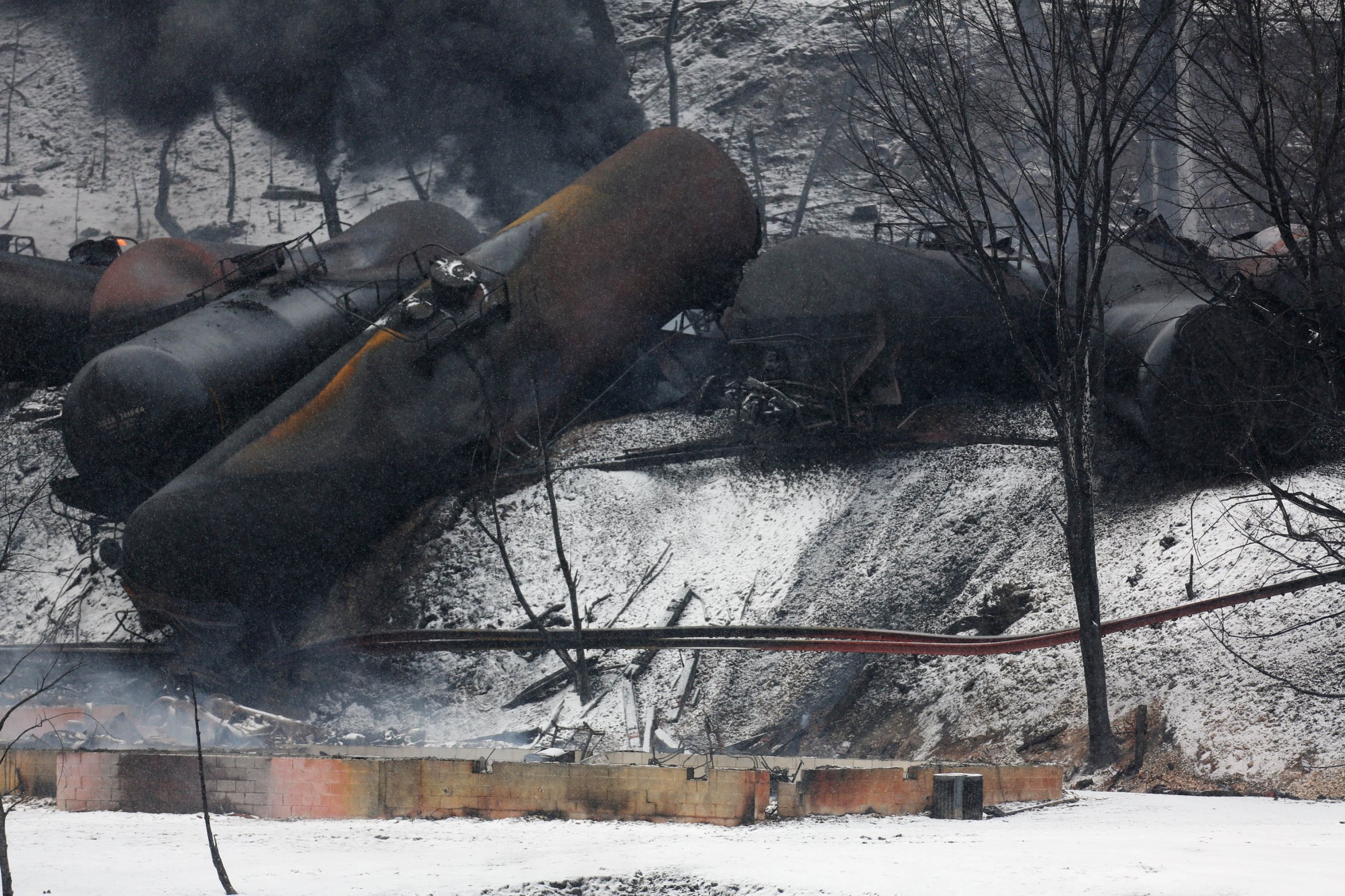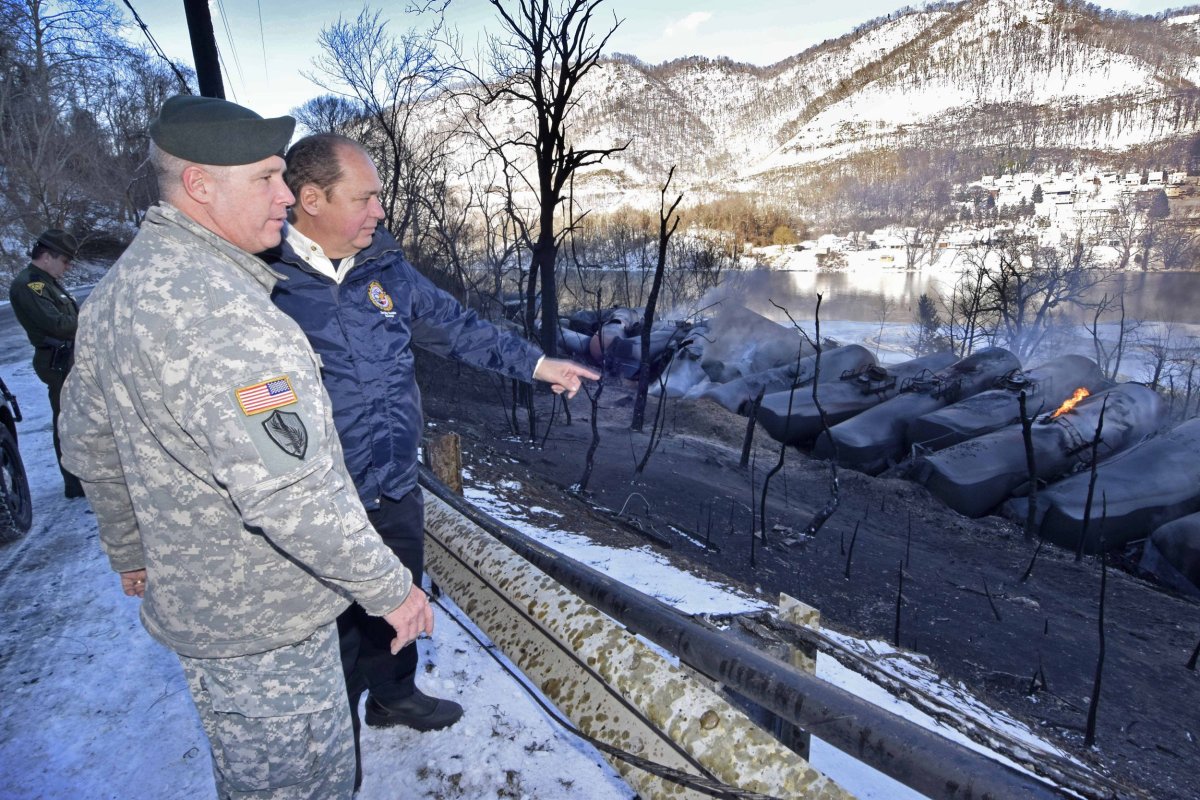
The orange flames no longer burned bright in the snow-covered woods near Mount Carbon in West Virginia on Friday. But days after a massive train derailment in the small community, located about 30 miles from the state capital, smoke still smoldered from the enormous oil tank train cars lying perpendicular across the tracks. The accident forced more than 100 residents from their homes during an exceptionally cold winter and raised fears of toxic contamination in a state still reeling from a major chemical spill a year ago.
The 109-car train was carrying more than three million gallons of Bakken oil from North Dakota when 27 cars derailed midday on Monday, February 16, near the Kanawha River. Residents of Mount Carbon, which has a population of some 400 people, told the media they witnessed fireballs; one house in nearby Boomer burned down and its owner, who managed to escape, was treated for possible injuries. River water tests have showed no signs of oil contamination, and the water authority has restored service after shutting water intakes from the river. On Thursday, officials told residents it was safe to drink water without boiling it, and by Friday morning, the last fires had gone out and the residents of all but five households had returned to their homes.
A day after the accident, West Virginia Governor Earl Ray Tomblin surveyed the wreckage. "It was just a sight that you're not used to seeing," he tells Newsweek. "The flames were still coming out of a couple of the tanks. Many of the tanks had gaping holes in the tops where they had exploded."
Now people's lives are getting back to normal, the governor says, adding, "It could have been a whole lot worse."
The crash is the latest in a series of major train accidents involving Bakken oil since the boom in North Dakota began around 2006. Among them: A 2013 derailment in Lac-Megantic, Canada that killed 47 people and a 2014 derailment in Lynchburg, Virginia, that dumped oil into a nearby river. The Virginia accident involved the same type of tank car and the same transport company, CSX, involved in this week's West Virginia derailment.
Because the Bakken boom is so new, people are still learning the risks involved. "This is a very born-yesterday industry," says Fred Millar, a rail safety consultant. "It's just really a spate of accidents that have been happening and they're just continuing."
Millar blames defective tank cars traveling at high speeds on congested routes, among other issues. Last December, The Wall Street Journal cited federal regulator data that say in 2009, U.S. trains carried on average 21,000 barrels of oil per day. By December 2014, that number was 1.1 million.
Crude Bakken oil, the type involved in the West Virginia derailment, is known for being particularly dangerous. "The oil itself doesn't act like the crude oil we used to know 30, 40 years ago," says Paul Ziemkiewicz, director of the West Virginia Water Research Institute, which is affiliated with West Virginia University and the United States Geological Survey. "It has a lot of volatile compounds in it, things that are much more prone to explosion."
"When one car ruptures, it heats up the adjacent cars," says Alan Stankevitz who runs the website DOT111.info, which monitors oil train safety issues. "It begins to boil.… You can hear it hiss."

Given their state's history with toxic accidents, some West Virginians are wary of reports that the Kanawha River is free of oil from the derailment. But water testing indicates that residents there have so far fared better than their neighbors. In January 2014, in an area known as "Chemical Valley" for its numerous chemical plants, a coal-cleaning compound leaked into the Elk River, leaving 300,000 residents without drinking water. "We learned a lot from the experience we had last year," Tomblin says.
Not all constituents are convinced. "It's just another example of the lack of attention that's been given to the prevention of chemical disasters in this area," Maya Nye, executive director of the West Virginia-based community coalition People Concerned About Chemical Safety, says about the February 16 derailment. "It's almost annually that we have massive chemical disasters. We're more used to responding to emergencies than we are preventing the disasters."
West Virginia state leaders have long come under fire for choosing pro-business policies over environmental ones. In fact, state lawmakers recently repealed the Alternative and Renewable Energy Portfolio Act, which required electric utility companies to use alternative and renewable sources. Tomblin, the governor, says lawmakers no longer felt that bill was necessary, given other alternative-energy activities in place in the state.
Now that the fires have burned out near Mount Carbon, federal and state agencies can investigate the wreckage more closely. "There is a long way to go," says Sarah Feinberg, acting administrator of the Federal Railroad Administration. "A long investigation ahead."
Feinberg says train camera footage and recorder data indicate that the train did not collide with anything on the tracks and that the footage is "unremarkable." The train was traveling at 33 miles per hour; the speed limit is 50.
Tomblin says CSX, the corporation that operated the train, told him that section of track had been inspected just three days before the crash. But the extreme weather could have been a significant factor, he says.
A 2007 paper by an agency affiliated with the Department of Transportation states that snow and ice can cause derailments and switches to malfunction. Icy tracks can cause rail car wheels to lose control and cold weather degrades the tracks. Between 1995 and 2005, the paper states, weather-related derailments caused nearly $164 million in damage and six deaths.
The paper also notes that for high temperatures, the CSX company requires its train operators to reduce speed. It is unclear if the company mandates the same for cold temperatures, and a company spokeswoman declined to comment on whether the train was running on schedule, citing the ongoing investigation.
Two rail operators—an engineer and a conductor—were involved in the incident. CSX declined to provide employment information or comment on whether those operators had been treated for injuries.
Amtrak also operates at the site of the derailment. A spokesman says service there is suspended.
Correction: This article originally incorrectly stated Sarah Feinberg's title. She is now the acting administrator of the Federal Railroad Administration, no longer chief of staff for the Department of Transportation.
Uncommon Knowledge
Newsweek is committed to challenging conventional wisdom and finding connections in the search for common ground.
Newsweek is committed to challenging conventional wisdom and finding connections in the search for common ground.
About the writer
Max Kutner is a senior writer at Newsweek, where he covers politics and general interest news. He specializes in stories ... Read more
To read how Newsweek uses AI as a newsroom tool, Click here.








